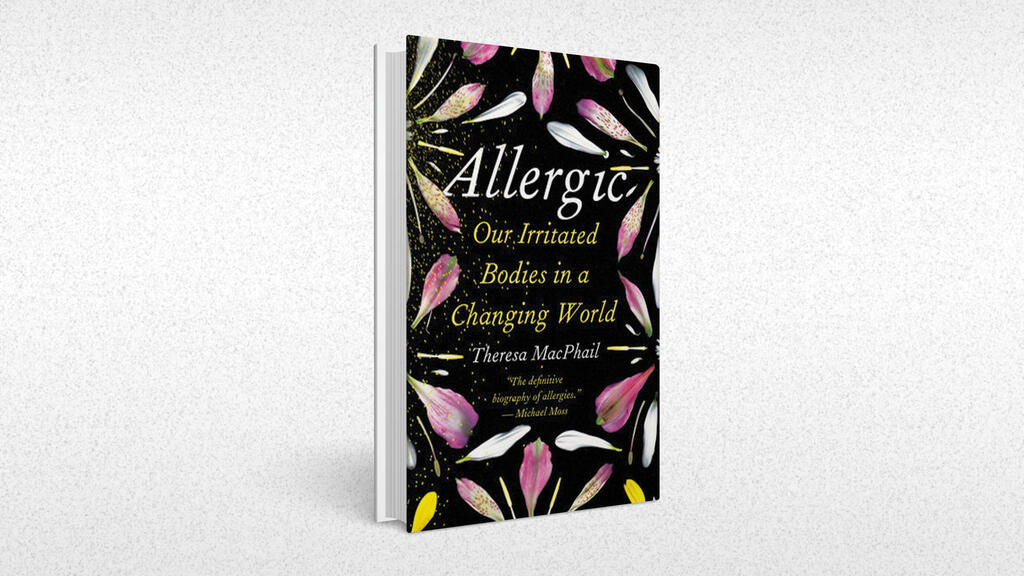Getting your Trinity Audio player ready...
When she was just 24 years old, the father of American medical anthropologist Theresa MacPhail's passed away from a severe allergic reaction after he was stung on his neck by a bee. Beyond the utter shock, MacPhail eventually went on with her life without delving deeply into what exactly happened to him. Only 20 years later, when she began experiencing recurrent and varying respiratory inflammations and was diagnosed with allergies herself, her focus changed.
More stories:
The result of her awakening was a five-year personal and scientific journey to diagnose the allergy problem in the 21st century, which yielded a fascinating new book called "Allergic: Our Irritated Bodies in a Changing World."
The book is the first of its kind in popular science and studies the growing problem of allergies in recent decades. It includes interviews with top researchers and experts in the field. MacPhail tries to find the smoking gun - the true reason why the world has become so sensitive and allergic. Spoiler alert: there is no one explanation, but several circumstances that simulate one another. A more optimistic spoiler revealed in the book is that the phenomenon is complex and tough, but there are things that can be done about it.
But first, a few sentences about allergies, that were clinically described for the first time as "hay fever" just about 200 years ago. It is a chronic disease caused by a fault in the immune system, which identifies harmless substances such as food, drugs, plant pollen, insect venom, and more as dangerous, triggering an exaggerated immune response, which is, in fact, the disease itself.
The allergic response to these substances (allergens) manifests when they come into contact with various tissues in the body, and will usually cause symptoms in those tissues. For example, exposure to skin tissues will cause rash and itching, exposure to upper respiratory tissues will cause a runny nose, sneezing, tearing, and itching of the face and throat, and exposure to digestive tissues will cause abdominal pain and more. In extreme cases, allergies can lead to life-threatening situations due to an anaphylactic reaction that involves the cardiovascular system.
My entire family is allergic
Can we blame genetics?
Many times, allergy problems are attributed to genetic inheritance. However, scientific research only partially supports this notion. In her book, MacPhail says that there is no single gene, segment, or region in DNA that causes allergies. She points out that in scientific studies, 141 different regions in the human genome have been identified as associated with an increased risk of developing hay fever, asthma, or eczema. The challenge, she writes, is to understand which specific genes control parts of our immune system and how they do it.
MacPhail explains that genes certainly play a part in allergic responses, but their expression is a complex matter influenced by factors such as hormone levels, age, environment, and interactions between certain genes. In other words, genetics can tell us a lot about our tendency for allergies, but often do not tell us what we really need to know: What it is exactly we are allergic to, what the allergic reaction would be, and how severe.
Conclusion: Genes cannot be the sole or even the primary cause of our disturbances and hypersensitivity. Allergies can develop even in those without a family history of allergies and can occur at any point in life, including adulthood. Therefore, the solution to allergies is not necessarily biological, and it is worth digging deeper to find out more.
Is it me or is it harder to breathe here all of a sudden?
Is the environment to blame?
Our natural environment, especially the air we breathe, has a substantial impact on our immune function and increases our allergic risk. Industrialization, which has raised the level of pollutants in the air, and extreme weather changes we experience (global warming, floods, storms, etc.) that alter the seasons and the natural plant life, play a significant role. For example, by 2040, the level of plant pollen is expected to be twice as high as today and correspondingly exacerbate our respiratory allergies. A 2020 study by the "Wellcome Sanger Institute" demonstrated that increased exposure to allergens creates a spectrum of immune system responses that intensify over time.
However, MacPhail notes that if the environment is to blame, then all animals in nature should be affected as well. She says that, despite also being exposed to these changing conditions, wild animals do not develop allergies, while domesticated animals do. Apparently, the prevalence of allergies in our pets is on the rise, with more cases of itching among dogs, birds, and horses, and coughing or wheezing among cats. The primary driving factor is their food, which is man-made. Evidently, the correlation has something to do with humans.
Conclusion: The environment is undoubtedly a key factor, but it is not the exclusive or central factor in creating our allergies. Instead of looking outward, it may be worth checking inside ourselves and our daily habits, and see how this affects our immune systems and those of our pets.
Maybe it's the constant stress?
Is modern lifestyle to blame?
Are we responsible for our allergies? Scientific research in the past decades has increasingly highlighted our personal responsibility in this area as well. True, there's genetics that teaches us about the predisposition and likelihood of allergies. Yes, there is an environment that becomes more problematic. On top of this, our daily lifestyle also plays a crucial role in creating the problem, and in this context, the changes we can make are very significant.
Here are some key factors to pay attention to:
- Stress: Stress directly affects our immune system responses. A study from the University of Michigan found that certain white blood cells (mast cells) have highly reactive responses to hormones released by the body under stress (such as cortisol and adrenaline). Another study from the Technical University of Munich found a correlation between allergies and common mental disorders like depression or anxiety.
- Hygiene: Scientific research increasingly supports the hypothesis that being "too clean" or "too hygienic" is not beneficial. The general idea, integrated within the framework of microbiome research, is that we should be exposed to a wide variety of bacteria to train our immune system. In the absence of sufficient exposure, the body increases its response to other stimuli such as dust or pollen. In this context, a Canadian study found that living with dogs reduced the rates of asthma and obesity due to indirect exposure to bacteria that dogs carry. Other studies encourage exposing children to various "pollutants" early in life to develop tolerance at an earlier age.
- Nutrition: Here too, a key factor is a healthy microbiome and diversity in our gut. A study conducted by the University of North Carolina and the University of Chicago in 2019 showed that healthy infants have a specific group of bacteria in their gut that protects against allergies. Moreover, the Western diet, which is low in fiber and high in sugar, depletes the bacteria in the gut and impairs its proper functioning against allergies.
- Medication: The use of antibiotics in both humans and animals disrupts balance. Scientists are currently trying to identify which microbes are critical for a healthy immune function, but for now, the best advice is to consume a balanced diet rich in fiber and natural foods.
The correct answer: All of the above!
MacPhail concluded her book with an optimistic yet very realistic tone. Her venture to find a diagnosis for the problem ended with her understanding that this is a much broader issue of human vulnerability. Her very broad advice was to address the problem together, and transition into more balanced and sustainable lives.
She also had an important message for the scientific community and the general public: start taking people with allergies more seriously and don't see them as a minor issue. MacPhail warned against assuming that people are faking or exaggerating, and that all in all - people are just trying to take care of themselves and of their children.
MacPhail's advice: Shower less?
Here are some changes Theresa MacPhail made in her lifestyle to boost her immunity to allergies:
- She eats more natural and less processed foods, while focusing on consuming a wide variety of foods.
- She does not shower every day.
- She changes her bedding less frequently.
- She makes sure to get at least seven hours of sleep and engage in at least one physical exercise per day.
- She minimizes the use of skincare products.
- She makes sure to get frequent exposure to daylight.
- She reduces the use of antibiotics to a minimum.
Allergy stats:
- The number of adults and children diagnosed with mild, moderate, or severe allergies consistently increases every year. The estimate is that 30-40% of the global population suffers from some type of allergic disease, and millions have a severe condition that threatens their health. Nearly half of all individuals with allergies have more than one allergy.
- Around 235 million people worldwide suffer from asthma (respiratory allergy), and approximately 240 million have food allergies.
- 10%-30% of the world's population suffers from hay fever, and up to 10% have drug allergies.
- In the United States: one person is rushed to the emergency room every two hours on average due to a severe allergic reaction; Asthma hospitalizations tripled between 1970 and 1990 before stabilizing at today's rates; Asthma rates continue to rise in developing countries.
- A study by the European Academy of Allergy and Clinical Immunology showed that by 2025, up to half of Europeans may suffer from allergies.
- In addition to existing medications, scientific research focuses on finding immunotherapy techniques or vaccines to assist with allergies. Another research direction is the development of genetic technologies to alter the immune system's activity and genetically engineered food products, such as soybeans that do not produce the protein that can trigger an allergic reaction. Complementary medical techniques such as acupuncture, traditional Chinese herbal medicine, and homeopathy have shown effectiveness in reducing symptoms.




